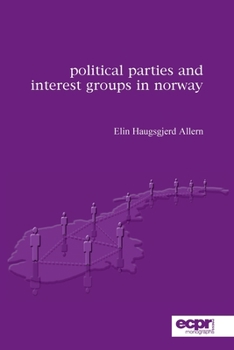Political Parties and Interest Groups in Norway
How do today's political parties relate to other organisations? Do they prefer rather distant relationships with a wide range of interest groups - or have they virtually detached themselves from civil society altogether? Scholars seem to agree that traditionally close relationships - such as those between social democratic parties and trade unions - have grown weaker since the 1960s. But to date only limited systematic research has been conducted. While parties and interest groups attract a great deal of attention from political scientists, the links between them have been largely overlooked. This book is an attempt to bridge the gap, starting from the party side of the relationship. It throws new light on the topic by presenting a theory-driven, comprehensive study of Norway's seven major political parties and their relationships with interest groups at the beginning of the new millennium. Based on original and extensive data, including party documents, in-depth interviews with key players and a survey of national party elites, Elin Haugsgjerd Allern paints a nuanced picture of the nature and significance of these relationships and the factors that shape them. A major conclusion is that Norway's parties tend to maintain rather distant but wide-ranging relationships with interest groups today. However, some parties still have fairly strong links with their traditional associates and a narrower network of links with other groups. Hence, Allern also shows that significant differences exist between parties that are apparently exposed to the same social, political and institutional environment.
Format:Paperback
Language:English
ISBN:0955820367
ISBN13:9780955820366
Release Date:December 2012
Publisher:ECPR Press
Length:390 Pages
Weight:1.21 lbs.
Dimensions:0.8" x 6.1" x 9.2"
Customer Reviews
0 rating





